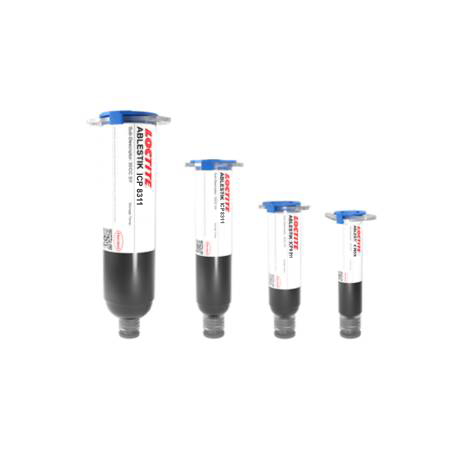LOCTITE ABLESTIK ICP 8311
Harmonization Code : 3506.91.90.99 | Prepared glues and other prepared adhesives, not elsewhere specified or included; products suitable for use as glues or adhesives, put up for retail sale as glues or adhesives, not exceeding a net weight of 1 kg ; Adhesives based on polymers of headings 3901 to 3913 or on rubber; Other ; Other
Main features
- Snap curable
- Sn Compatible
- Jet Dispensing & Stenci printing
Product Description
LOCTITE® ABLESTIK ICP 8311 is an electrically conductive adhesive designed for applications where a fast cure is required. It is ideally suited for high throughput photovoltaic dispense and print processes and applications where high adhesion strength is required. Low and stable contact resistance is achieved on substrates containing Sn during reliability testing.
LOCTITE® ABLESTIK ICP 8311 is a flexible acrylate that is compatible with Sn (Tin). It is typically used for flexible interconnects in photovoltaic shingle applications. It is developed for solar panel applications with max 25um filler cut and DSC onset temperature of 60° Celsius, suitable for high volume jet dispensing, screen printing and stencil printing processes.
Cure Schedule
- 10 - 15 seconds @ 150°C
Technical Specifications
| Electrical Properties | |
| Volume Resistivity Volume Resistivity Volume resistivity, also called volume resistance, bulk resistance or bulk resistivity is a thickness dependent measurement of the resistivity of a material perpendicular to the plane of the surface. | 3.9x10-4 Ohms⋅cm |
| Physical Properties | |
| Thixotropic index Thixotropic index Thixotropic Index is a ratio of a material s viscosity at two different speeds in Ambient temperature, generally different by a factor of ten. A thixotropic material s viscosity will decrease as agitation or pressure is increased. It indicates the capability of a material to hold its shape. Mayonnaise is a great example of this. It holds its shape very well, but when a shear stress is applied, the material easily spreads. It helps in choosing a material in accordance to the application, dispense method and viscosity of a material. | 4.2 |
| Viscosity Viscosity Viscosity is a measurement of a fluid’s resistance to flow. Viscosity is commonly measured in centiPoise (cP). One cP is defined as the viscosity of water and all other viscosities are derived from this base. MPa is another common unit with a 1:1 conversion to cP. A product like honey would have a much higher viscosity -around 10,000 cPs- compared to water. As a result, honey would flow much slower out of a tipped glass than water would. The viscosity of a material can be decreased with an increase in temperature in order to better suit an application | 14,600 mPa.s |



